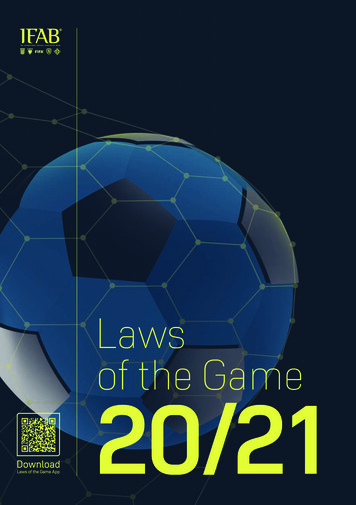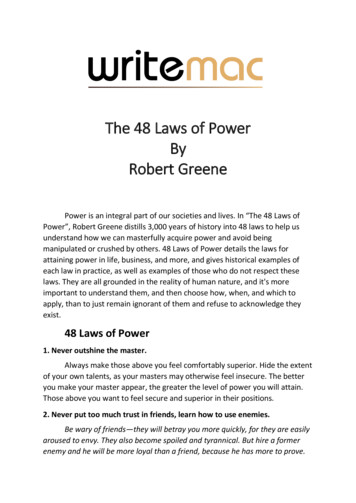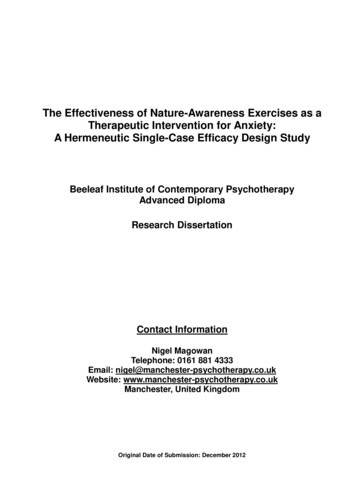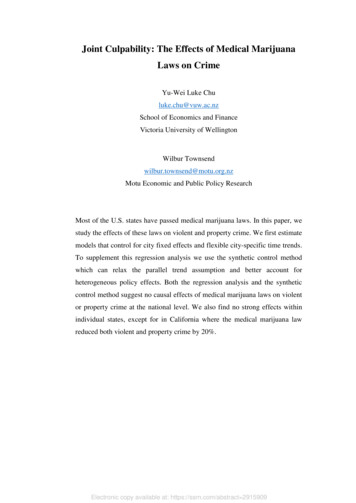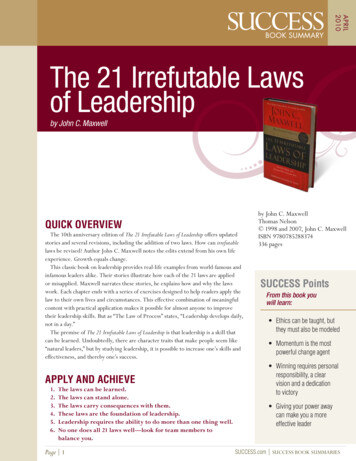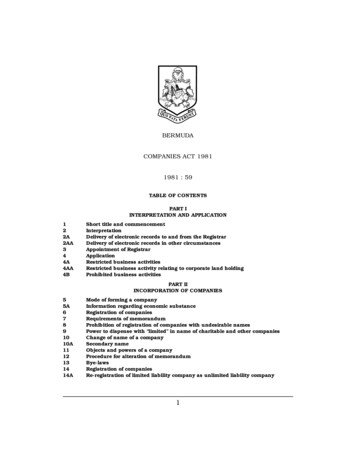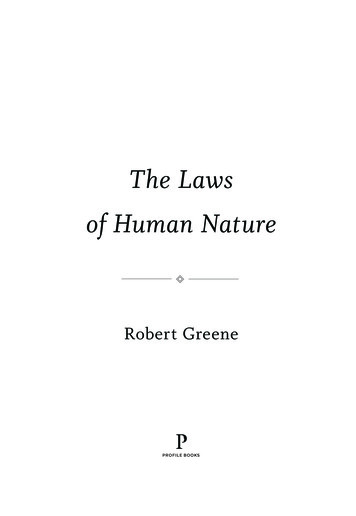
Transcription
The Lawsof Human NatureRobert GreeneVIKINGPROFILE BOOKSLaws of Human Nature prelims.indd 59780525428145 LawsOfHuman TX.inddv22/08/2018 17:558/16/18 2:51 PM
First published in Great Britain in 2018 byProfile Books Ltd3 Holford YardBevin WayLondonWC1X 9HDwww.profilebooks.comPublished by arrangement with Viking,an imprint of Penguin Publishing Group,a division of Penguin Random House LLCCopyright Robert Greene, 20181 3 5 7 9 10 8 6 4 2Printed and bound in Great Britain by Clays Ltd, Elcograf S.p.A.The moral right of the author has been asserted.All rights reserved. Without limiting the rights under copyright reserved above, no part of thispublication may be reproduced, stored or introduced into a retrieval system, or transmitted, in anyform or by any means (electronic, mechanical, photocopying, recording or otherwise), withoutthe prior written permission of both the copyright owner and the publisher of this book.A CIP catalogue record for this book is available from the British Library.ISBN 978 1 78816 155 8 (hardcover)ISBN 978 1 78283 919 1 (export edition)eISBN 978 1 78283 388Laws of Human Nature prelims.indd 622/08/2018 17:55
8Contents1Introduction1 Master Your Emotional SelfThe Law of Irrationality13The Inner AthenaKeys to Human NatureStep One: Recognize the BiasesStep Two: Beware the Inflaming FactorsStep Three: Strategies Toward Bringing Out the Rational Self2 Transform Self- love into EmpathyThe Law of Narcissism42The Narcissistic SpectrumExamples of Narcissistic Types3 See Through People’s MasksThe Law of R ole- playing72The Second LanguageKeys to Human NatureObservational SkillsDecoding KeysThe Art of Impression Management4 Determine the Strength of People’s CharacterThe Law of Compulsive Behavior102The PatternKeys to Human NatureCharacter SignsToxic TypesThe Superior Character2:51 PM9780525428145 LawsOfHuman TX.inddix 8/16/18 2:51 PM
5 Become an Elusive Object of DesireThe Law of Covetousness131The Object of DesireKeys to Human NatureStrategies for Stimulating DesireThe Supreme Desire6 Elevate Your PerspectiveThe Law of Shortsightedness150Moments of MadnessKeys to Human NatureFour Signs of Shortsightedness and Strategies to Overcome ThemThe Farsighted Human7 Soften People’s Resistance by Confirming Their S elf- opinionThe Law of Defensiveness172The Influence GameKeys to Human NatureFive Strategies for Becoming a Master PersuaderThe Flexible M ind— Self- strategies8 Change Your Circumstances by Changing Your AttitudeThe Law of Self- sabotage202The Ultimate FreedomKeys to Human NatureThe Constricted (Negative) AttitudeThe Expansive (Positive) Attitude9 Confront Your Dark SideThe Law of Repression231The Dark SideKeys to Human NatureDeciphering the Shadow: Contradictory BehaviorThe Integrated Human9780525428145 LawsOfHuman TX.inddx 8/16/182:51 PM
810 Beware the Fragile EgoThe Law of Envy261Fatal FriendsKeys to Human NatureSigns of EnvyEnvier TypesEnvy TriggersBeyond Envy11 Know Your LimitsThe Law of Grandiosity291The Success DelusionKeys to Human NatureThe Grandiose LeaderPractical Grandiosity12 Reconnect to the Masculine or Feminine Within YouThe Law of Gender Rigidity320The Authentic GenderKeys to Human NatureGender Projection— TypesThe Original Man/ Woman13 Advance with a Sense of PurposeThe Law of Aimlessness356The VoiceKeys to Human NatureStrategies for Developing a High Sense of PurposeThe Lure of False Purposes14 Resist the Downward Pull of the GroupThe Law of Conformity391An Experiment in Human NatureKeys to Human NatureThe Court and Its CourtiersThe Reality Group2:51 PM9780525428145 LawsOfHuman TX.inddxi 8/16/18 2:51 PM
15 Make Them Want to Follow YouThe Law of Fickleness438The Entitlement CurseKeys to Human NatureStrategies for Establishing AuthorityThe Inner Authority16 See the Hostility Behind the Friendly FaçadeThe Law of Aggression473The Sophisticated AggressorKeys to Human NatureThe Source of Human AggressionPassive Aggression— Its Strategies and How to Counter ThemControlled Aggression17 Seize the Historical MomentThe Law of Generational Myopia518The Rising TideKeys to Human NatureThe Generational PhenomenonGenerational PatternsStrategies for Exploiting the Spirit of the TimesThe Human Beyond Time and Death18 Meditate on Our Common MortalityThe Law of Death Denial562The Bullet in the SideKeys to Human NatureA Philosophy of Life Through DeathAcknowledgments587Selected Bibliography589Index5939780525428145 LawsOfHuman TX.inddxii 8/16/18 2:51 PM
8IntroductionIf you come across any special trait of meanness or stupidity . . . you must becareful not to let it annoy or distress you, but to look upon it merely as anaddition to your knowledge— a new fact to be considered in studying thecharacter of humanity. Your attitude towards it will be that of themineralogist who stumbles upon a very characteristic specimen of a mineral.— Arthur SchopenhauerThroughout the course of our lives, we inevitably have to deal with a variety of individuals who stir up trouble and make our lives difficult andunpleasant. Some of these individuals are leaders or bosses, some are colleagues,and some are friends. They can be aggressive or p assive- aggressive, but they aregenerally masters at playing on our emotions. They often appear charming andrefreshingly confident, brimming with ideas and enthusiasm, and we fall undertheir spell. Only when it is too late do we discover that their confidence is irrational and their ideas i ll- conceived. Among colleagues, they can be thosewho sabotage our work or careers out of secret envy, excited to bring us down.Or they could be colleagues or hires who reveal, to our dismay, that they arecompletely out for themselves, using us as s tepping- stones.What inevitably happens in these situations is that we are caught off guard,not expecting such behavior. Often these types will hit us with elaborate coverstories to justify their actions, or blame handy scapegoats. They know how toconfuse us and draw us into a drama they control. We might protest or becomeangry, but in the end we feel rather helpless— the damage is done. Then another such type enters our life, and the same story repeats itself.We often notice a similar sensation of confusion and helplessness when itcomes to ourselves and our own behavior. For instance, we suddenly say something that offends our boss or colleague or f riend— we are not quite sure whereit came from, but we are frustrated to find that some anger and tension fromwithin has leaked out in a way that we regret. Or perhaps we enthusiasticallythrow our weight into some project or scheme, only to realize it was quite foolish and a terrible waste of time. Or perhaps we fall in love with a person who is2:51 PM9780525428145 LawsOfHuman TX.indd1 8/16/182:51 PM
2THE L AWS OF HUM A N NATUR Eprecisely the wrong type for us and we know it, but we cannot help ourselves.What has come over us, we wonder?In these situations, we catch ourselves falling into s elf- destructive patternsof behavior that we cannot seem to control. It is as if we harbor a stranger withinus, a little demon who operates independently of our willpower and pushes usinto doing the wrong things. And this stranger within us is rather weird, or atleast weirder than how we imagine ourselves.What we can say about these two t hings— people’s ugly actions and ourown occasionally surprising b ehavior— is that we usually have no clue as towhat causes them. We might latch onto some simple explanations: “That person is evil, a sociopath” or “Something came over me; I wasn’t myself.” Butsuch pat descriptions do not lead to any understanding or prevent the same patterns from recurring. The truth is that we humans live on the surface, reactingemotionally to what people say and do. We form opinions of others and ourselves that are rather simplified. We settle for the easiest and most convenientstory to tell ourselves.What if, however, we could dive below the surface and see deep within,getting closer to the actual roots of what causes human behavior? What if wecould understand why some people turn envious and try to sabotage our work,or why their misplaced confidence causes them to imagine themselves as godlike and infallible? What if we could truly fathom why people suddenly behaveirrationally and reveal a much darker side to their character, or why they arealways ready to provide a rationalization for their behavior, or why we continually turn to leaders who appeal to the worst in us? What if we could lookdeep inside and judge people’s character, avoiding the bad hires and personalrelationships that cause us so much emotional damage?If we really understood the roots of human behavior, it would be muchharder for the more destructive types to continually get away with their actions.We would not be so easily charmed and misled. We would be able to anticipatetheir nasty and manipulative maneuvers and see through their cover stories. Wewould not allow ourselves to get dragged into their dramas, knowing in advance that our interest is what they depend on for their control. We would finally rob them of their power through our ability to look into the depths of theircharacter.Similarly, with ourselves, what if we could look within and see the sourceof our more troubling emotions and why they drive our behavior, often against9780525428145 LawsOfHuman TX.indd2 8/16/182:51 PM
8Introduction 3our own wishes? What if we could understand why we are so compelled todesire what other people have, or to identify so strongly with a group that wefeel contempt for those who are on the outside? What if we could find out whatcauses us to lie about who we are, or to inadvertently push people away?Being able to understand more clearly that stranger within us would help usto realize that it is not a stranger at all but very much a part of ourselves, andthat we are far more mysterious, complex, and interesting than we had imagined. And with that awareness we would be able to break the negative patternsin our lives, stop making excuses for ourselves, and gain better control of whatwe do and what happens to us.Having such clarity about ourselves and others could change the course ofour lives in so many ways, but first we must clear up a common misconception:we tend to think of our behavior as largely conscious and willed. To imaginethat we are not always in control of what we do is a frightening thought, but infact it is the reality. We are subject to forces from deep within us that drive ourbehavior and that operate below the level of our awareness. We see the r esults— our thoughts, moods, and actions— but have little conscious access to what actually moves our emotions and compels us to behave in certain ways.Look at our anger, for instance. We usually identify an individual or a groupas the cause of this emotion. But if we were honest and dug down deeper, wewould see that what often triggers our anger or frustration has deeper roots. Itcould be something in our childhood or some particular set of circumstancesthat triggers the emotion. We can discern distinct patterns if we look— whenthis or that happens, we get angry. But in the moment that we feel anger, we arenot reflective or r ational— we merely ride the emotion and point fingers. Wecould say something similar about a whole slew of emotions that we feel— specific types of events trigger sudden confidence, or insecurity, or anxiety, orattraction to a particular person, or hunger for attention.Let us call the collection of these forces that push and pull at us from deepwithin human nature. Human nature stems from the particular wiring of ourbrains, the configuration of our nervous system, and the way we humans process emotions, all of which developed and emerged over the course of thefive million years or so of our evolution as a species. We can ascribe many ofthe details of our nature to the distinct way we evolved as a social animal toensure our s urvival— learning to cooperate with others, coordinating our actions with the group on a high level, creating novel forms of communication2:51 PM9780525428145 LawsOfHuman TX.indd3 8/16/182:51 PM
4THE L AWS OF HUM A N NATUR Eand ways of maintaining group discipline. This early development lives onwithin us and continues to determine our behavior, even in the modern, sophisticated world we live in.To take one example, look at the evolution of human emotion. The survivalof our earliest ancestors depended on their ability to communicate with oneanother well before the invention of language. They evolved new and complex emotions— joy, shame, gratitude, jealousy, resentment, et cetera. The signs ofthese emotions could be read immediately on their faces, communicating theirmoods quickly and effectively. They became extremely permeable to the emotions of others as a way to bind the group more tightly t ogether— to feel joy orgrief as o ne— or to remain united in the face of danger.To this day, we humans remain highly susceptible to the moods and emotions of those around us, compelling all kinds of behavior on our part— unconsciously imitating others, wanting what they have, getting swept up inviral feelings of anger or outrage. We imagine we’re acting of our own freewill, unaware of how deeply our susceptibility to the emotions of others in thegroup is affecting what we do and how we respond.We can point to other such forces that emerged from this deep past and thatsimilarly mold our everyday behavior— for instance, our need to continuallyrank ourselves and measure our self- worth through our status is a trait that isnoticeable among all h unter- gatherer cultures, and even among chimpanzees,as are our tribal instincts, which cause us to divide people into insiders or outsiders. We can add to these primitive qualities our need to wear masks to disguise any behavior that is frowned upon by the tribe, leading to the formationof a shadow personality from all the dark desires we have repressed. Our ancestors understood this shadow and its dangerousness, imagining it originatedfrom spirits and demons that needed to be exorcised. We rely on a different myth—“something came over me.”Once this primal current or force within us reaches the level of consciousness, we have to react to it, and we do so depending on our individual spirit andcircumstances, usually explaining it away superficially without really understanding it. Because of the precise way in which we evolved, there are a limitednumber of these forces of human nature, and they lead to the behavior mentioned a bove— envy, grandiosity, irrationality, shortsightedness, conformity,aggression, and passive aggression, to name a few. They also lead to empathyand other positive forms of human behavior.For thousands of years, it has been our fate to largely grope in the shadows9780525428145 LawsOfHuman TX.indd4 8/16/182:51 PM
8Introduction 5when it comes to understanding ourselves and our own nature. We have laboredunder so many illusions about the human animal— imagining we descendedmagically from a divine source, from angels instead of primates. We have foundany signs of our primitive nature and our animal roots deeply distressing, something to deny and repress. We have covered up our darker impulses with allkinds of excuses and rationalizations, making it easier for some people to getaway with the most unpleasant behavior. But finally we’re at a point where wecan overcome our resistance to the truth about who we are through the sheerweight of knowledge we have now accumulated about human nature.We can exploit the vast literature in psychology amassed over the last onehundred years, including detailed studies of childhood and the impact of ourearly development (Melanie Klein, John Bowlby, Donald Winnicott), as well asworks on the roots of narcissism (Heinz Kohut), the shadow sides of our personality (Carl Jung), the roots of our empathy (Simon Baron- Cohen), and theconfiguration of our emotions (Paul Ekman). We can now cull the many advances in the sciences that can aid us in our self- understanding— studies of thebrain (Antonio Damasio, Joseph E. LeDoux), of our unique biological makeup(Edward O. Wilson), of the relationship between the body and the mind (V. S.Ramachandran), of primates (Frans de Waal) and hunter- gatherers (Jared Diamond), of our economic behavior (Daniel Kahneman), and of how we operatein groups (Wilfred Bion, Elliot Aronson).We can also include in this the works of certain philosophers (Arthur Schopenhauer, Friedrich Nietzsche, José Ortega y Gasset) who have illuminated somany aspects of human nature, as well as the insights of many novelists (GeorgeEliot, Henry James, Ralph Ellison), who are often the most sensitive to theunseen parts of our behavior. And finally, we can include the rapidly expanding library of biographies now available, revealing human nature in depth andin action.This book is an attempt to gather together this immense storehouse ofknowledge and ideas from different branches (see the bibliography for the keysources), to piece together an accurate and instructive guide to human nature,basing itself on the evidence, not on particular viewpoints or moral judgments.It is a brutally realistic appraisal of our species, dissecting who we are so we canoperate with more awareness.Consider The Laws of Human Nature a kind of codebook for decipheringpeople’s b ehavior— ordinary, strange, destructive, the full gamut. Each chapterdeals with a particular aspect or law of human nature. We can call them laws in2:51 PM9780525428145 LawsOfHuman TX.indd5 8/16/182:51 PM
6THE L AWS OF HUM A N NATUR Ethat under the influence of these elemental forces, we humans tend to react inrelatively predictable ways. Each chapter has the story of some iconic individual or individuals who illustrate the law (negatively or positively), along withideas and strategies on how to deal with yourself and others under the influenceof this law. Each chapter ends with a section on how to transform this basichuman force into something more positive and productive, so that we are nolonger passive slaves to human nature but actively transforming it.You might be tempted to imagine that this knowledge is a bit o ld- fashioned.After all, you might argue, we are now so sophisticated and technologicallyadvanced, so progressive and enlightened; we have moved well beyond ourprimitive roots; we are in the process of rewriting our nature. But the truth isin fact the o pposite— we have never been more in the thrall of human natureand its destructive potential than now. And by ignoring this fact, we are playing with fire.Look at how the permeability of our emotions has only been heightenedthrough social media, where viral effects are continually sweeping through usand where the most manipulative leaders are able to exploit and control us.Look at the aggression that is now openly displayed in the virtual world, whereit is so much easier to play out our shadow sides without repercussions. Noticehow our propensities to compare ourselves with others, to feel envy, and toseek status through attention have only become intensified with our ability tocommunicate so quickly with so many people. And finally, look at our tribaltendencies and how they have now found the perfect medium to operate i n— we can find a group to identify with, reinforce our tribal opinions in a virtualecho chamber, and demonize any outsiders, leading to mob intimidation. Thepotential for mayhem stemming from the primitive side of our nature has onlyincreased.It is simple: Human nature is stronger than any individual, than any institution or technological invention. It ends up shaping what we create to reflectitself and its primitive roots. It moves us around like pawns.Ignore the laws at your own peril. Refusing to come to terms with humannature simply means that you are dooming yourself to patterns beyond yourcontrol and to feelings of confusion and helplessness.The Laws of Human Nature is designed to immerse you in all aspects ofhuman behavior and illuminate its root causes. If you let it guide you, it will9780525428145 LawsOfHuman TX.indd6 8/16/182:51 PM
8Introduction 7radically alter how you perceive people and your entire approach to dealingwith them. It will also radically change how you see yourself. It will accomplish these shifts in perspective in the following ways:First, the Laws will work to transform you into a calmer and more strategic observer ofpeople, helping to free you from all the emotional drama that needlessly drains you.Being around people stirs up our anxieties and insecurities as to how othersperceive us. Once we feel such emotions, it becomes very hard to observe people as we are drawn into our own feelings, evaluating what people say and doin personal terms— do they like me or dislike me? The Laws will help you avoidfalling into this trap by revealing that people are generally dealing with emotions and issues that have deep roots. They’re experiencing some desires anddisappointments that predate you by years and decades. You cross their path ata particular moment and become the convenient target of their anger or frustration. They’re projecting onto you certain qualities they want to see. In mostcases, they’re not relating to you as an individual.This should not upset you but liberate you. The book will teach you to stoptaking personally their insinuating comments, shows of coldness, or momentsof irritation. The more you grasp this, the easier it will be to react not withyour emotions but rather with the desire to understand where their behaviormight come from. You will feel much calmer in the process. And as this takesroot in you, you will be less prone to moralize and judge people; instead youwill accept them and their flaws as part of human nature. People will like youall the more as they sense this tolerant attitude in you.Second, the Laws will make you a master interpreter of the cues that people continuallyemit, giving you a much greater ability to judge their character.Normally, if we pay attention to people’s behavior, we are in a rush to fittheir actions into categories and to hurry to conclusions, so we settle for thejudgment that suits our own preconceptions. Or we accept their self- servingexplanations. The Laws will rid you of this habit by making it clear how easyit is to misread people and how deceptive first impressions can be. You willslow yourself down, mistrust your initial judgment, and instead train yourselfto analyze what you see.You will think in terms of o pposites— when people overtly display sometrait, such as confidence or hypermasculinity, they are most often concealingthe contrary reality. You will realize that people are continually playing to thepublic, making a show of being progressive and saintly only to better disguisetheir shadow. You will see the signs of this shadow leaking out in everyday life.2:51 PM9780525428145 LawsOfHuman TX.indd7 8/16/182:51 PM
8THE L AWS OF HUM A N NATUR EIf people take an action that seems out of character, you will take note: whatoften appears out of character is actually more of their true character. If peopleare essentially lazy or foolish, they leave clues to this in the smallest of detailsthat you can pick up well before their behavior harms you. The ability to gaugepeople’s true worth, their degree of loyalty and conscientiousness, is one of themost important skills you can possess, helping you avoid the bad hires, partnerships, and relationships that can make your life miserable.Third, the Laws will empower you to take on and outthink the toxic types who inevitably cross your path and who tend to cause l ong- term emotional damage.Aggressive, envious, and manipulative people don’t usually announce themselves as such. They have learned to appear charming in initial encounters, touse flattery and other means of disarming us. When they surprise us with theirugly behavior, we feel betrayed, angry, and helpless. They create constant pressure, knowing that in doing so they overwhelm our minds with their presence,making it doubly hard to think straight or strategize.The Laws will teach you how to identify these types in advance, which isyour greatest defense against them. Either you will steer clear of them or, foreseeing their manipulative actions, you will not be blindsided and thus will bebetter able to maintain your emotional balance. You will learn to mentally cutthem down to size and focus on the glaring weaknesses and insecurities behindall of their bluster. You will not fall for their myth, and this will neutralizethe intimidation they depend on. You will scoff at their cover stories and elaborate explanations for their selfish behavior. Your ability to stay calm will infuriate them and often push them into overreaching or making a mistake.Instead of being weighed down by these encounters, you might even cometo appreciate them as a chance to hone your skills of s elf- mastery and toughenyourself up. Outsmarting just one of these types will give you a great deal ofconfidence that you can handle the worst in human nature.Fourth, the Laws will teach you the true levers for motivating and influencing people,making your path in life that much easier.Normally, when we meet resistance to our ideas or plans, we cannot helptrying to directly change people’s minds by arguing, lecturing, or cajolingthem, all of which makes them more defensive. The Laws will teach you thatpeople are naturally stubborn and resistant to influence. You must begin anyattempt by lowering their resistance and never inadvertently feeding their defensive tendencies. You will train yourself to discern their insecurities and9780525428145 LawsOfHuman TX.indd8 8/16/182:51 PM
8Introduction 9never inadvertently stir them up. You will think in terms of their self- interestand the self- opinion they need validated.Understanding the permeability of emotions, you will learn that the mosteffective means of influence is to alter your moods and attitude. People areresponding to your energy and demeanor even more than to your words. Youwill get rid of any defensiveness on your part. Instead, feeling relaxed andgenuinely interested in the other person will have a positive and hypnotic effect. You will learn that as a leader your best means of moving people in yourdirection lies in setting the right tone through your attitude, empathy, andwork ethic.Fifth, the Laws will make you realize how deeply the forces of human nature operatewithin you, giving you the power to alter your own negative patterns.Our natural response to reading or hearing about the darker qualities inhuman nature is to exclude ourselves. It is always the other person who is narcissistic, irrational, envious, grandiose, aggressive, or passive- aggressive. We almost always see ourselves as having the best intentions. If we go astray, it is thefault of circumstances or people forcing us to react negatively. The Laws willmake you stop once and for all this self- deluding process. We are all cut from thesame cloth, and we all share the same tendencies. The sooner you realize this,the greater your power will be in overcoming these potential negative traitswithin you. You will examine your own motives, look at your own shadow,and become aware of your own passive- aggressive tendencies. This will make itthat much easier to spot such traits in others.You will also become humbler, realizing you’re not superior to others in theway you had imagined. This will not make you feel guilty or weighed downby your self- awareness, but quite the opposite. You will accept yourself as acomplete individual, embracing both the good and the bad, dropping your falsified self- image as a saint. You will feel relieved of your hypocrisies and free tobe more yourself. People will be drawn to this quality in you.Sixth, the Laws will transform you into a more empathetic individual, creating deeperand more satisfying bonds with the people around you.We humans are born with a tremendous potential for understanding peopleon a level that is not merely intellectual. It is a power developed by our earliestancestors, in which they learned how to intuit the moods and feelings of othersby placing themselves in their perspective.The Laws will instruct you in how to bring out this latent power to the2:51 PM9780525428145 LawsOfHuman TX.indd9 8/16/182:51 PM
10THE L AWS OF HUM A N NATUR Ehighest degree possible. You will learn to slowly cut off your incessant interiormonologue and listen more closely. You will train yourself to assume the other’s viewpoint as best you can. You will use your imagination and experiencesto help you feel how they might feel. If they are describing something painful,you have your own painful moments to draw upon as analogues. You will notbe simply intuitive, but rather you will analyze the information you glean inthis empathic fashion, gaining insights. You will continually cycle betweenempathy and analysis, always updating what you observe and increasing yourability to see the world through their eyes. You will notice a physical sensationof connection between you and the other that will emerge from this practice.You will need a degree of humility in this process. You can never knowexactly what people are thinking and can easily make mistakes, and so youmust not rush to judgments but keep yourself open to learning more. Peopleare more complex than you imagine. Your goal is to simply see their point ofview better. As you go through this process, it becomes like a muscle that getsstronger the more you exercise it.Cultivating such empathy will have innumerable benefits. We are all self- absorbed, locked in our own worlds. It is a therapeutic and liberating experience to be drawn outside ourselves and into the world of another. It is whatattracts us to film and any form of fiction, entering the minds and
the prior written permission of both the copyright owner and the publisher of this book. A CIP catalogue record for this book is available from the British Library. ISBN 978 1 78816 155 8 (hardcover) ISBN 978 1 78283 919 1 (export edition) eISBN 978 1 78283

